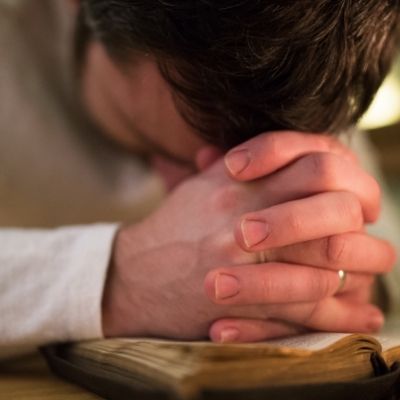
After exploring the somewhat-forgotten books (and characters) of Ezra and Nehemiah, we now turn to Daniel, whose exploits have entered into our communal folklore. Daniel in the lion’s den. The handwriting on the wall. All have all become familiar images and idioms in many western cultures. But there is more to Daniel than these fascinating accounts; thus, before exploring Daniel’s prayer, let us look at who he was and the backdrop against which he framed his prayer.
In a listing of lesser-known facts about Daniel, he is reputed to be a descendent of King David. In 605 B.C., when Nebuchadnezzar successfully besieged Jerusalem and carried off some of the treasure from the temple of God to Babylon, he also carried off some of the young men of the royal family with him to serve him in his court. Daniel, a teenager, was one of them. We can assume that Daniel was quite handsome, for scriptures record that only the good looking, royal kids got to serve in Nebuchadnezzar’s court.
Not only was Daniel easy on the eyes, but he was renowned for his wisdom and intelligence. All the captives in the court need to be able to pass a three-year course in Babylonian language and literature: Daniel and his friends (Shadrach, Meshack and Abednego) not only passed with flying colors, but were found to be 10 times wiser than all the experienced magicians and enchanters in the whole Persia kingdom. Daniel’s wisdom makes him a legend in his own time.
Along with his wisdom, he had the ability to interpret dreams. He gained great notoriety for understanding dreams in his youth, and was the only person who could interpret some of the most troubling dreams and visions for King Nebuchadnezzar and his son, Belshazzar.
Because of Daniel’s wisdom and abilities, he was chosen (or forced as the case may be) to serve as a government official, not just under Nebuchadnezzar, but the three subsequent kings as well. After interpreting the first king’s crazy dream, he was put in charge of all the pagan magicians in the court. All while maintaining his devout Jewish faith.
Finally, the key outstanding characteristic about Daniel was his righteousness. While we have biblical accounts of the failings of other great biblical characters, scripture is silent in regards to his shortcomings. He seems to have lived a blameless life. Hence, his enemies could only seek to ruin him by making it illegal to obey God, which was a priority for Daniel and which landed him in the lion’s den at about 80 years of age. A life lived long in the service of his Lord, while concurrently serving in foreign government.
Thus, we discover in Daniel a man who comes to God often, and in fervent prayer, including the one read this morning. In context, another change has come about in the secular rule; and as Daniel studies the prophecy of Jeremiah, he interprets the events as what was foreseen as the exile, perhaps, nearing its end. Jeremiah had predicted that the exile would last “70 years”, a number that is perhaps more symbolic than literal. It served to assert that the deportation and exile was a real thing (of which the people were well aware) but that it would be limited and would ultimately come to an end. It was an assurance that the Jews were not fated to the dislocation in perpetuity, even if it felt like it. Thus, while living in the reality of deportation, they had the hope of ultimate restoration as a people, if not as individuals.
Daniel continues in the practice of our other leaders of faith by following the traditional interpretation of Deuteronomy; reminded perhaps by the words of Jeremiah, that failure to follow the Torah and the covenant requirements would lead to the covenantal consequences of loss of God’s favor. Like Ezra and Nehemiah whom we have regarded earlier, Daniel accepts the exile as the punishment for the people of Israel which is just and deserved.
Thus, with his heart distraught over the failings of Israel, Daniel is moved to pray, and his prayer is framed as others in the Old Testament; beginning with doxological praise, then confession followed by petition and supplication. Implicit is the question, “How long, O Lord, must we suffer?” In his particular prayer, however, the focus is on confession, as he lays before God Israel’s blatant disobedience and the rejection of a relationship with their Lord. As he prays, he acknowledges the reality that Israel’s behavior has caused it to forfeit the right to ask anything of God. Yet still he appeals to God, praying with urgency, that God would “hear…look…forgive…listen…act”, knowing that the future of the people now rests entirely on God’s grace.
Ultimately, God does respond to Daniel, through the messenger Gabriel (yes, the same angel who came to Mary) that God has indeed heard Daniel’s prayer. He is told that the people would indeed endure great suffering, as punishment for their sins, but that the punishment is not open-ended. It will run its course, but they are given the promise of hope that it will ultimately come to an end. The good news from Gabriel, which is also found in Jeremiah, that there will indeed come a time, in the future, to “plant and restore”. We are reminded that the pattern of Israel’s life with YHWH God is one of suffering and restoration. While suffering is linked to disobedience, it is never, ever, the final word.
There are a couple of themes among many in this prayer that we might consider. The man Daniel, is remembered as good and righteous; yet, he is the one to fast, the one to don sackcloth and ashes, all of which were signs of penitence and mourning. He prays on behalf of and as part of the community that has turned its back on God. His confession is all about the community of Israel, of which he is a part.
I think sometimes in our Christian and societal practices, we tend to be more individualistic; that we think more in terms of our personal relationship with Jesus, the “Jesus and me” thinking. While that is certainly an aspect of our faith, we also need to see ourselves as a part of the larger Christian community, sharing in corporate as well as personal sin and salvation. While we might (or not) admit to our wrongdoing as individuals, but when we come to worship, we weekly confess our sins as part of this community. Together, we are made aware of sins of which we perhaps did not know we were guilty. Together, we confess our societal sins as well as our corporate omissions.
One commentator remarks, in regards to corporate prayer:
Participating regularly in corporate prayer begins to take out the individualistic assumption that Christianity is only about me and my relationship with God; and it begins to re-situate us as individual Christians in the congregation so that we become aware of this person who’s sick, this person who’s just had a baby, this person who’s unemployed, this person who’s just become a Christian. Participating in corporate prayer helps us discover that our lives as followers of Christ are tied up with one another’s. It helps us discover how God cares about the congregation as an entity—that it should be marked by the fruit of the Spirit and the [commission to love each other as Christ has loved us].
That’s not how Christians in America normally talk. You hear about “my own spiritual desires and demands”; you don’t really hear about the local congregation’s desires and demands. But regularly participating in corporate prayer reintroduces these ideas and reorients our thinking.
[Additionally, this] works against disunity because you begin to realize that that person that you are disregarding, mocking, or dismissing is actually part of your own body. You have to approach them and their problems—even when you disagree with them—differently than you would before.
Daniel’s prayer reminds us that we are all in this together!
Secondly, he prayed in “daring faith” as one commentator remarks. Daniel prayed despite not knowing what divine response he would receive, or when he would receive it, because he realized, as should we, that prayer is not an automatic mechanism that gives us what we request if we deposit the right “currency”. God is the one who sees the bigger picture and responds, in a sense, as a “free agent”, according to God’s divine plan. Thus, we too can pray with a daring faith, trusting God to respond in God’s love and mercy, all in God’s good time.
I challenge you this week to go forth, giving thanks for the church community in which we share our joys as well as our failings; while praying with a daring faith, trusting God to answer in mercy and faithfulness, in God’s good time and God’s good way. Thanks be to God. Amen.
